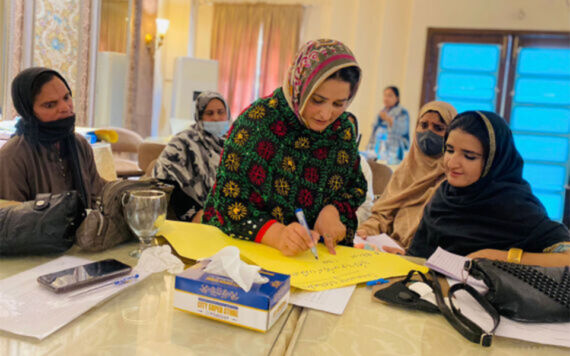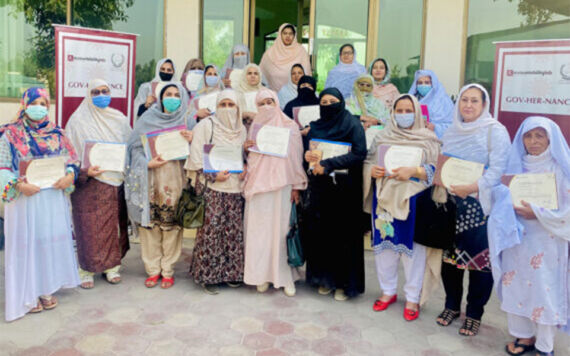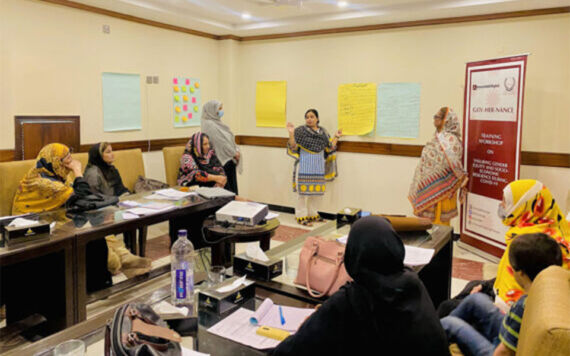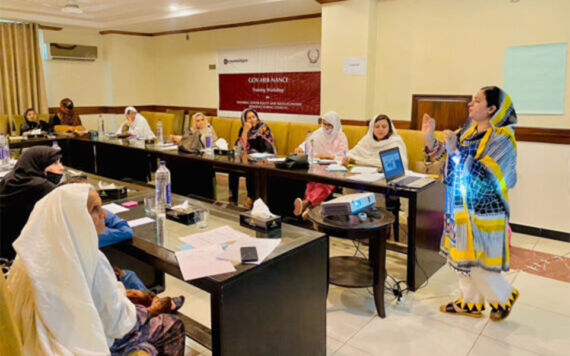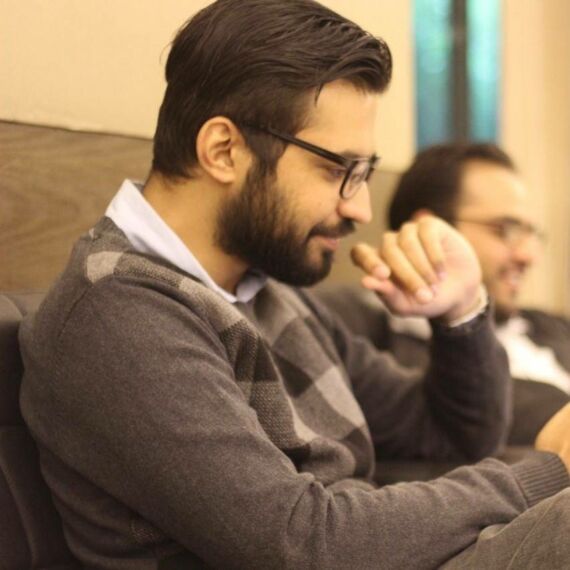| Project Name | Gov-HER-nance – Ensuring Gender Equity and Socio-Economic Resilience during COVID-19 in Pakistan |
| Commisioned by | Federal Ministry for Economic Cooperation and Development (BMZ) |
| Country | Pakistan |
| Implementing Organisation | Accountability Lab Pakistan – accountabilitylab.org |
| Duration | December 2021 – November 2022 |
The Challenge
Increased Impact of the Pandemic on Women: Lack of public awareness and inadequate health systems have resulted in marginalised groups in Pakistan being severely affected by the impact of COVID-19. Women in particular bear a higher risk of infection and other burdens related to the disease, given their roles in Pakistani society. In rural parts of the country, women are prevented from exercising their right to access healthcare or public health information due to cultural taboos and lack of reliable information.
Misinformations Leads to Increased Health Risks: Public health risks have been exacerbated by the increase in fake news, rumours and misinformation. Many rural women do not have open access to information and are also less likely to question rumours that are circulating in communities.
The Objective
The objective of the project is to strengthen the resilience of marginalized populations – especially women – in three districts of Khyber-Pakhtunkhwa Province against the negative impacts of COVID-19, future pandemics, and health emergencies.
The Target Group
Three districts – Mardan, Nowshehra and Peshawar – were strategically selected for project implementation. Mardan and Nowshehra are among the most conservative districts where women’s participation in governance is negligible. In Mardan, resistance for vaccination has been one of the strongest and the number of vaccinated women is among the lowest. Peshawar, on the other hand, is the provincial capital that may help to create greater room for women inclusion across the entire province. Accountability Lab engages 60 female leaders in total, from across six most affected UCs (Union Councils) in each of the three target districts. The female leaders reach out to up to 1800 female community members.

About Accountability Lab
Accountability Lab was founded in early 2012 as an effort to work with young people to develop new ideas for accountability, transparency, and open government. The organisation is active in nine countries, following the vision of a world in which resources are used wisely, decisions benefit everyone fairly, and people lead secure lives. Their mission is to make governance work for people through supporting active citizens, responsible leaders and accountable institutions.
Website: accountabilitylab.org
The Approach
Training Female Leaders: The project works with female leaders from government, media, and civil society, who will be part of a training program focused on engaging with communities for advocacy on COVID-19 prevention. Therefore, the participating women get trained in methods to demand equitable rights with regards to health and support services; establish linkages and communication with the communities and the local government and to build advocacy campaigns for improved access to public service deliveries.
Raising Awareness on COVID-19 and on Women’s Rights: Additionally, awareness raising campaigns in communities on building COVID-19 related resilience and demanding women’s fundamental rights are initiated. Sessions are conducted in women education institutions, during town hall meetings and within the communities. The sessions help the female leaders to mobilize women community members and rally support behind their efforts to engage with the local government offices and representatives.
Spreading Verified Information: Alongside a dissemination of COVID-19 related information and updates through monthly bulletins, a digital media and radio campaign helps communities to stay abreast of verified and trusted information. These disseminations will focus on fact checking and mythsbusting, to be spread among the communities, as well as women’s rights related information, and details about where local, community-based support is available.
Achieved Results
- 71 female leaders were trained and mentored on advocacy and claiming public service delivery
- 1,863 participants at 60 community awareness sessions on the right to equal access to health services and government facilitated support programs
- 1.8 million people were reached through digital media and radio campaigns to spread verified facts on COVID-19 related information
- 6,400 newsletters on COVID-19, women’s rights and local support were disseminated
Farhan Khalid
Programs Manager
Accountability Lab Pakistan
In the context of sustainable development, what do you consider the greatest challenge that you help to overcome in your country? What is special about your project and approach, with regard to the context in which it is located?
Pakistan is amongst the worst performing countries in terms of gender parity. Due to cultural dynamics and patriarchal social structures, women lack access to quality education and health services, decision making, employment opportunities, access to resources as compared to male counterparts. Women’s access to resources is dependent on their positions in other social relationships such as class, race, ethnicity, etc. The Gov-HER-nance project ensured incluson of the women from most marginalzied communities in governance and decision making by equipping them with required knowledge and skills. The women were guided on mechanisms to directly access the government for redressal of their repsective issues.
Let’s get specific: What was your most significant project success? What was especially important/notable? What are you particularly proud of having achieved?
As a result of the project interventions including capacity building workshops, community sessions, townhalls and media campaigns, women beneficiaries (from most marginalized communities) directly approached relavant government departments for redressal of their issues. Around 100 such women contacted the government departments in their area after a working relationship was established between government departments and women. Before the Gov-HER-nance project, women were not only unaware of their rights but also were unaware of the mechanism to seek support from the government for their issues. The project opened the access for the women to the government.
What have you learned and what experiences would you like to share with like-minded actors/practitioners?
Following are the key lessons learned from the Gov-HER-Nance Project: (1) Mainstreaming women in decision-making is the key for improved service delivery. (2) Women have a severely limited access to the public service delivery. (3) Working in partnerships with relevant stakeholders could yield desired results. (4) Partnerships between governments and the civil society could be a major success factor in fighting the pandemics or facilitating the access to public service deliveries. (5) Ownership of the project by communities is vital for the project’s success. (6) Creating direct linkages between Government Departments and communities could lead to the immediate redressal of issues. (7) Initiatives like Gov-HER-nance could be replicated in other districts.


